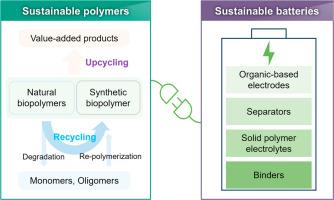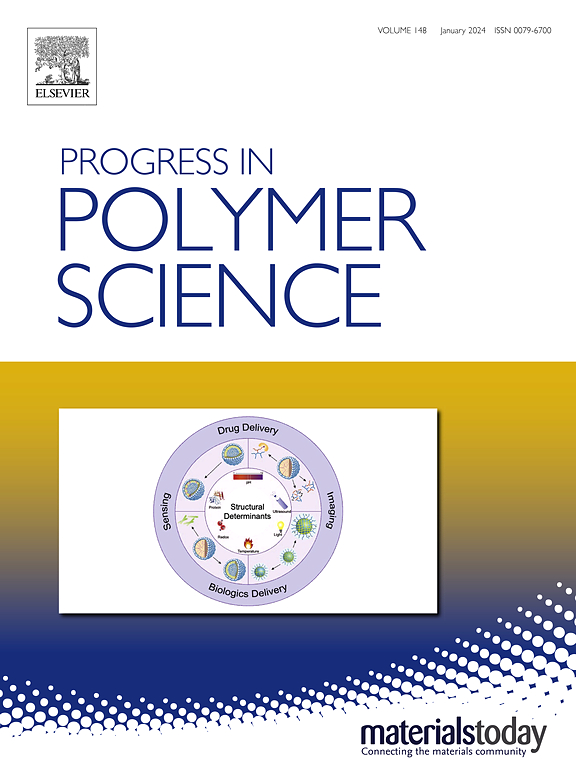Sustainable Polymers for Battery Applications
IF 26.1
1区 化学
Q1 POLYMER SCIENCE
引用次数: 0
Abstract
Synthetic polymers, known for their durability, low cost, and functionality, have become indispensable in our lives, yet they also raise significant environmental concerns. Concurrently, energy storage devices, particularly rechargeable batteries, are essential for everyday convenience and are witnessing exponential demand across various applications, from smartphones to personal computers and electric vehicles. As key technologies in achieving “Carbon Peak and Carbon Neutrality”, the sustainability of batteries establishes a critical goal for advancements in polymer development. Sustainable polymers derived from natural feedstocks or green processes, such as recycling and upcycling, have emerged as promising candidates for sustainable battery manufacturing. This includes applications in solid-state polymer electrolytes, binders, separators, and organic electrode materials. On one hand, sustainable polymers can significantly reduce our reliance on petroleum-based raw materials and eliminate the toxic solvents often used in battery production, thereby alleviating environmental concerns. On the other hand, the development of solid-state polymer electrolytes can lead to batteries with a more compact structure and improved energy density. However, the integration of sustainable polymers into battery technology is still in its early stages, and several challenges need to be addressed to effectively replace petroleum-based polymers. This review summarizes the cycling approaches to sustainable polymers and highlights pioneering research in battery applications over the past decade. We conclude by discussing the potential challenges and promising directions for the future development of batteries utilizing sustainable polymers.

电池应用的可持续聚合物
合成聚合物以其耐用性、低成本和功能性而闻名,已成为我们生活中不可或缺的一部分,但它们也引起了严重的环境问题。与此同时,能量存储设备,尤其是可充电电池,对日常生活的便利至关重要,从智能手机到个人电脑和电动汽车,各种应用的需求都呈指数级增长。作为实现“碳峰值和碳中和”的关键技术,电池的可持续性是聚合物发展的关键目标。从天然原料或绿色工艺(如回收和升级回收)中提取的可持续聚合物已成为可持续电池制造的有希望的候选者。这包括固态聚合物电解质,粘合剂,分离器和有机电极材料的应用。一方面,可持续聚合物可以显著减少我们对石油基原材料的依赖,并消除电池生产中经常使用的有毒溶剂,从而减轻环境问题。另一方面,固态聚合物电解质的发展可以使电池具有更紧凑的结构和更高的能量密度。然而,将可持续聚合物整合到电池技术中仍处于早期阶段,要想有效地取代石油基聚合物,还需要解决一些挑战。本文综述了可持续聚合物的循环方法,并重点介绍了过去十年中电池应用方面的开创性研究。最后,我们讨论了利用可持续聚合物的电池未来发展的潜在挑战和有希望的方向。
本文章由计算机程序翻译,如有差异,请以英文原文为准。
求助全文
约1分钟内获得全文
求助全文
来源期刊

Progress in Polymer Science
化学-高分子科学
CiteScore
48.70
自引率
1.10%
发文量
54
审稿时长
38 days
期刊介绍:
Progress in Polymer Science is a journal that publishes state-of-the-art overview articles in the field of polymer science and engineering. These articles are written by internationally recognized authorities in the discipline, making it a valuable resource for staying up-to-date with the latest developments in this rapidly growing field.
The journal serves as a link between original articles, innovations published in patents, and the most current knowledge of technology. It covers a wide range of topics within the traditional fields of polymer science, including chemistry, physics, and engineering involving polymers. Additionally, it explores interdisciplinary developing fields such as functional and specialty polymers, biomaterials, polymers in drug delivery, polymers in electronic applications, composites, conducting polymers, liquid crystalline materials, and the interphases between polymers and ceramics. The journal also highlights new fabrication techniques that are making significant contributions to the field.
The subject areas covered by Progress in Polymer Science include biomaterials, materials chemistry, organic chemistry, polymers and plastics, surfaces, coatings and films, and nanotechnology. The journal is indexed and abstracted in various databases, including Materials Science Citation Index, Chemical Abstracts, Engineering Index, Current Contents, FIZ Karlsruhe, Scopus, and INSPEC.
 求助内容:
求助内容: 应助结果提醒方式:
应助结果提醒方式:


